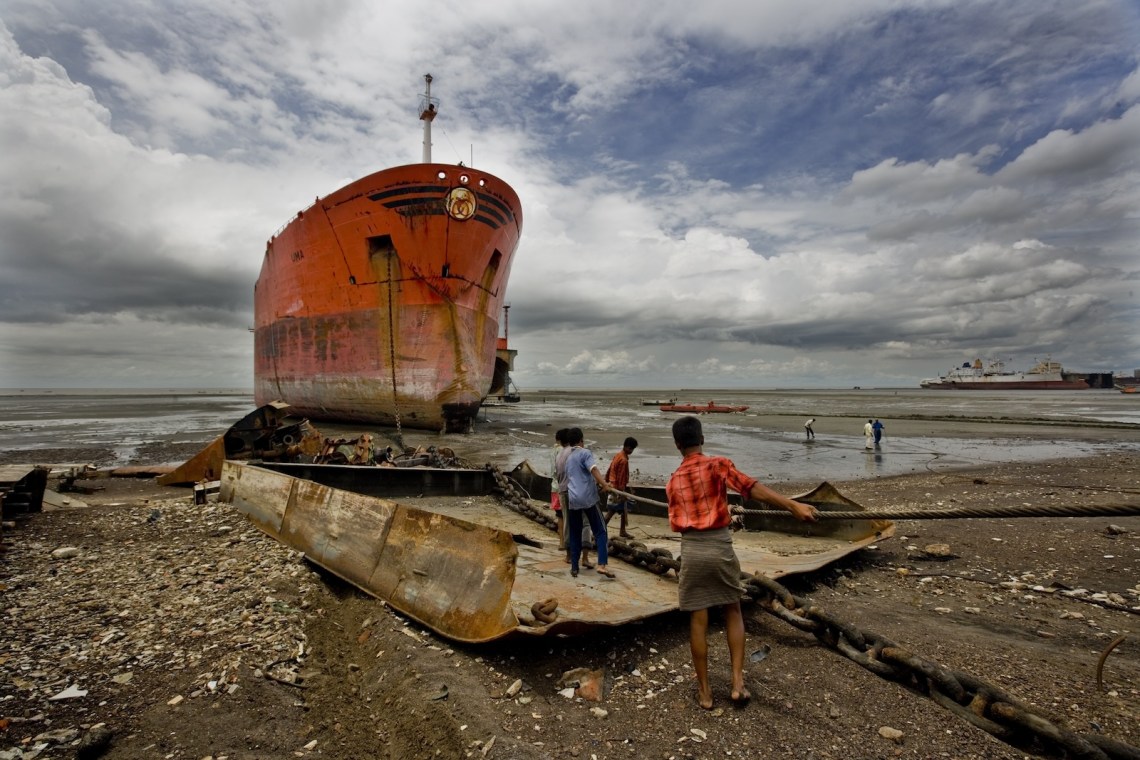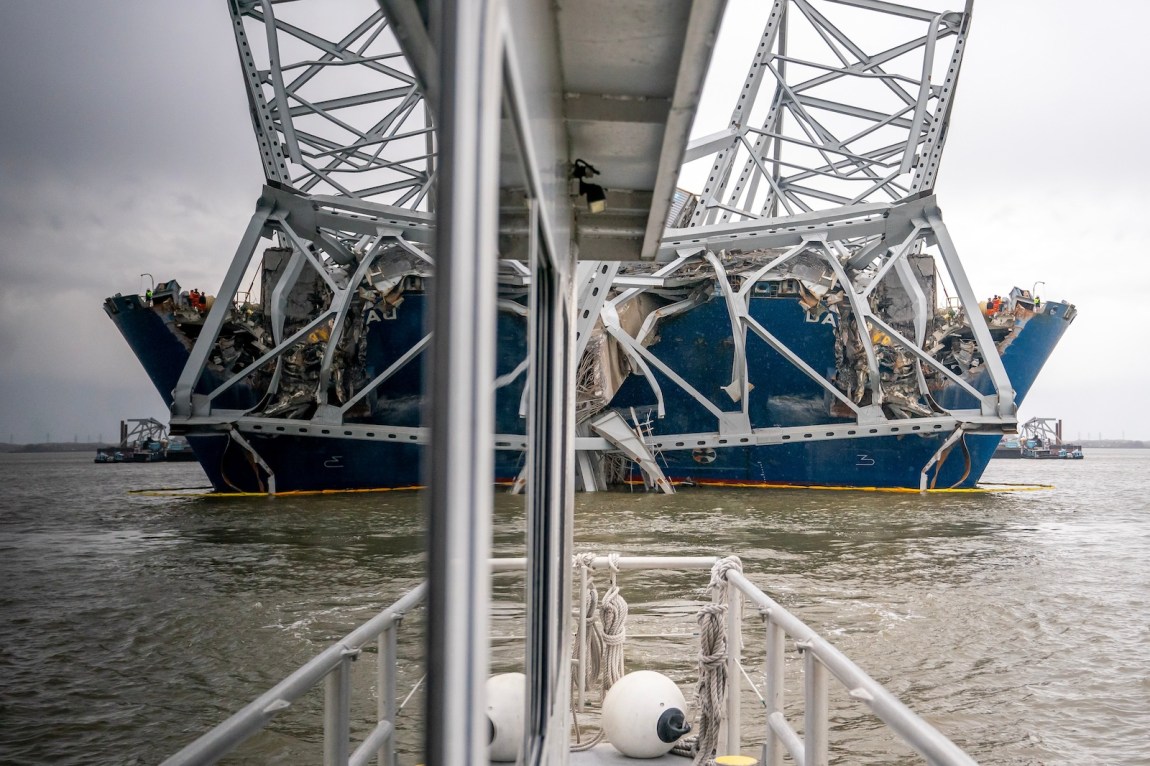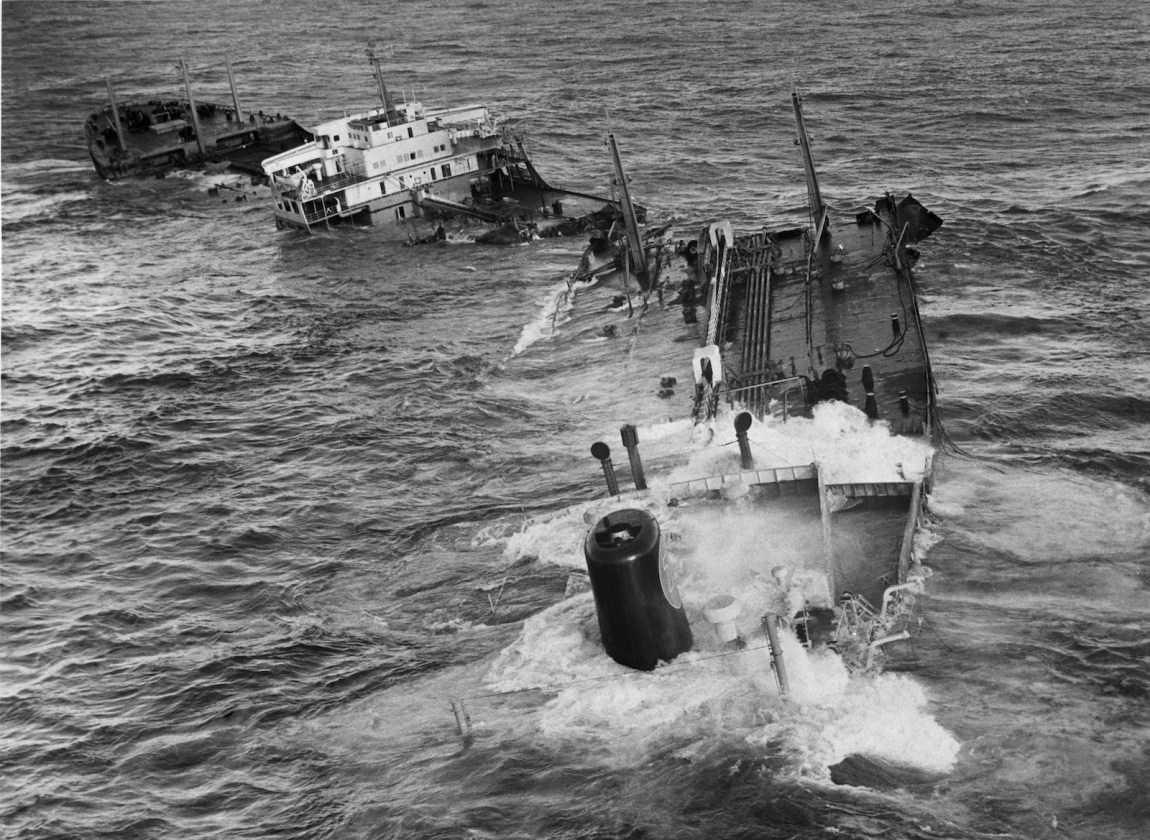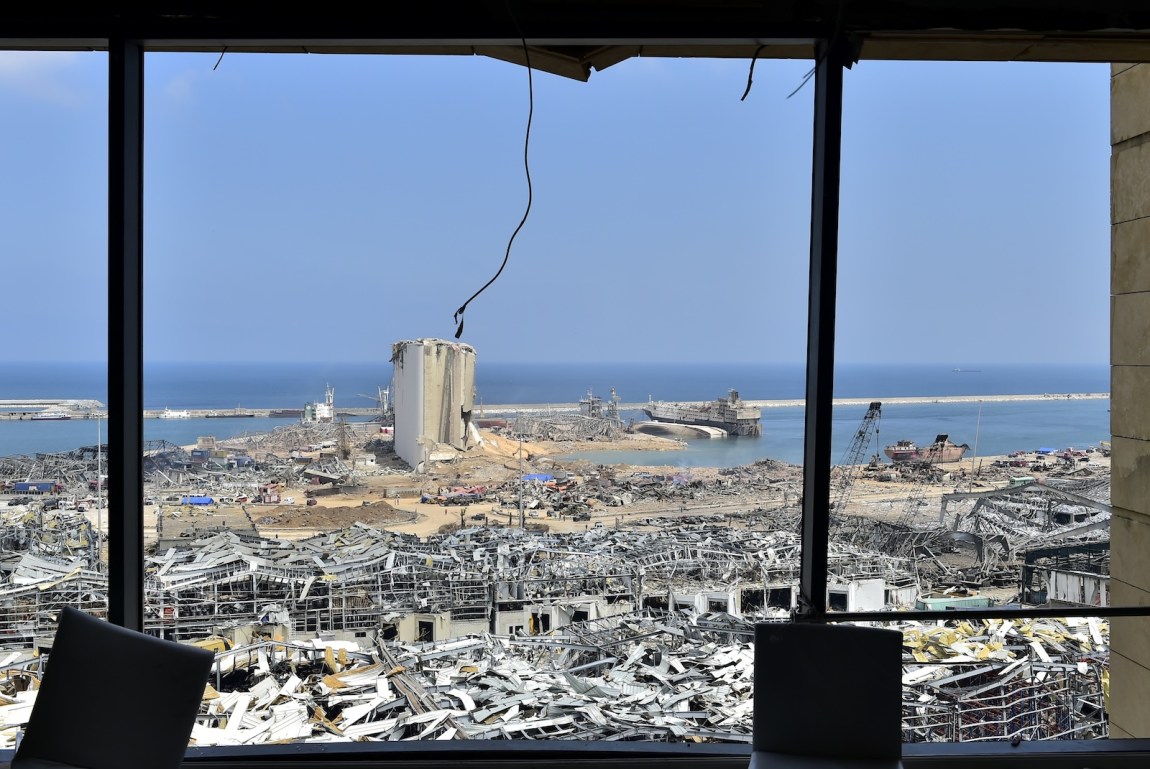In the early morning hours of March 26, emergency workers in Baltimore received a mayday call from the Dali, a 985-foot container ship. Shortly after setting sail from the city’s port, the vessel had lost power, and with it control over its engine and navigation instruments. It was on course to hit the Francis Scott Key Bridge, an important artery for commuters and goods that spans the Patapsco River. Minutes after the call, the Dali struck one of the bridge’s pylons, causing the whole structure to collapse. First responders managed to close the bridge, but six construction workers who were filling potholes on the road, all immigrants from Central America, are presumed dead. Now one of America’s busiest ports is closed. Rebuilding the bridge will take years.
The Baltimore bridge crash is a global story. The Dali was on its way to Sri Lanka with a cargo of around 4,700 containers, including some with hazardous materials. It was chartered to the Danish shipping giant Maersk, flew the flag of Singapore, and was managed by the Singaporean company Synergy Marine. Its owner, the Singapore-based entity Grace Ocean Private Limited, is in turn a subsidiary of Grace Ocean Investment Limited, registered in the British Virgin Islands.
Investigations into what caused the Dali’s blackout are ongoing. It could have been human error or a mechanical problem. In 2023 inspectors at a port in Chile found a faulty pressure gauge that was fixed before the vessel left. Authorities are also looking into whether an unregulated “dirty” shipping fuel led to engine failure.
Whatever caused it, the crash has brought fresh attention to the global shipping industry, which has lately been shaken by a series of high-profile accidents. Three years ago, the Ever Given, then one of the world’s largest container ships, got stuck in the Suez Canal, one of the world’s most used waterways. It was freed six days later, having meanwhile caused a traffic jam that blocked billions of dollars in trade. The striking images of the giant ship sitting helplessly across the canal, with a long line of vessels behind it, illustrated how dependent the world economy is on the seaborn movement of goods. Ships move more than 80 percent of trade worldwide. The shipping industry contracted during the Covid-19 pandemic, but has since resumed a decades-long pattern of growth.
Shipping is central not only to commerce but also to geopolitical conflict, as the unfolding wars in Ukraine and Gaza have made clear. In September 2022 the oil tanker Zephyr I collided with a container ship in the Malacca Strait off the coast of Malaysia. The vessel was twenty years old, sailed under the flag of Panama, and was owned through a shell company registered in the Marshall Islands. At the time of the crash, it was carrying Russian crude oil to China. Two months later, US Treasury officials sanctioned an international oil transport network that used the Zephyr I and other tankers to move Iranian oil, itself under US sanctions.
The regime of sanctions that ensnares countries such as Venezuela, Iran, and now Russia has led to the proliferation of so-called dark or ghost ships like the Zephyr I—aging vessels with obscure ownership and questionable insurance arrangements. Their systematic use took off around 2019, initially to circumvent embargoes on Venezuelan and Iranian oil. Analysts believe that Russia is now luring shipowners and operators with premium rates.
Ghost ships are effectively unregulated. In order to avoid detection, they often turn off their automatic identification system, a tracking signal that helps commercial vessels avoid collisions. To comply with sanctions, companies that provide environmental and safety certification for ships, without which they cannot acquire insurance, no longer inspect vessels carrying oil and other goods from Russia, Iran, and Venezuela. No spillage was reported in the Zephyr crash, but should there have been an oil spill, it is unlikely that the owner could have been identified and held liable for damage.
Shipping-related disputes have been more direct in the Red Sea. Since last November, in response to Israel’s bombardment of the Gaza Strip, the Houthis, an Iranian-backed rebel group in Yemen, have launched missile attacks on vessels linked to Israel, the US, and the UK. As a result many shipping companies no longer use that route, which in 2023 was estimated to have carried some 22 percent of global seaborne trade, including oil and natural gas, cars, and manufactured goods. Now they opt for the costly alternative around the Cape of Good Hope. For those ships that still choose the Suez Canal, insurance premiums have shot up dramatically.
The Houthi rebels have at times been outwitted by the shipping industry. In February 2023 they sunk the Rubymar, a vessel their media described as “British-owned.” But further inspection, as the journalist Robin Wright has reported, revealed the ship’s only link to Britain to be an address in Southampton, listed as belonging to the owner, which was a company registered in the Marshall Islands. The Rubymar was partly run by a Lebanese company, its travel was organized by a different Lebanese operator, its crew was Syrian, it had been chartered by a Saudi Arabian commodities firm, and it flew the flag of Belize.
Advertisement
*
Shipping is an opaque business. With their owners hidden behind shell companies and their flags registered to tax havens and secrecy jurisdictions, vessels regularly dodge sanctions, skirt labor laws, avoid taxes, trade in illicit goods, and flout safety standards. The industry is also dirty: observers have estimated that it produces almost 3 percent of global greenhouse gas emissions.
That global shipping is in such a mess can in some part be put down to dysfunction at the UN-affiliated International Maritime Organization (IMO), which designs and oversees the industry’s regulations but lacks enforcement mechanisms of its own. Instead it depends on the governments of member countries to implement and enforce its rules. Imagine, for instance, that a ship arriving in a US port fails to meet the IMO standards for the allowable concentration of sulfur in its fuel. That violation would be detected by the port authorities who inspect the ship—in our case, the US Coast Guard—and decide what fines, if any, to impose.
Another challenge to regulation is the existence of so-called flags of convenience registries, which permit shipowners of any nationality to register their vessels in a particular jurisdiction, thereby becoming subject to its labor and tax laws, as well as its safety and environmental standards. The International Transport Workers’ Federation (ITF), which comprises 677 trade unions, identifies forty-two countries that currently serve as flags of convenience jurisdictions. It is no coincidence that several of them double as tax havens, such as the Bahamas, Bermuda, and the Cayman Islands. Since the invasion of Ukraine, Mongolia, the world’s second-largest landlocked country, has seen an uptick in the registration of ships, many of them believed to be carrying Russian goods; its registry is managed by a company with an address in Singapore. The three most significant open registries, however, have long been Liberia, Panama, and the Marshall Islands. More than 45 percent of the world’s shipping fleet, measured by tonnage, sails under one of their flags. By that measure, Liberia is the largest shipping nation in the world.
For centuries ships flew foreign flags as a means of subterfuge. Such acts of camouflage were mostly born out of war and conflict. Shipowners chose strategic flags to avoid being targeted by warring parties or pirates and privateers. The practice picked up during World War I and became systematic in the decades that followed as a way to avoid newly introduced taxes and labor laws. Flags of convenience spread considerably in the years leading up to World War II. Prior to America’s entry into the war in 1941, neutrality laws meant that the US could not trade with Britain and France, which were already fighting Nazi Germany. Registering US-owned ships under the neutral Panamanian flag allowed America to supply the Allies with vital goods without, technically speaking, running afoul of neutrality.
In the 1950s and 1960s corporate and individual income tax rates hit historic highs. As business owners and especially big oil companies sought to reduce their tax and wage bills, they turned away from registering ships in traditional maritime countries like the US, the UK, Norway, Greece, and Germany, and looked instead to flags of convenience jurisdictions, above all Panama and Liberia. Between 1947 and 1949 US officials supported the creation of an open registry in Liberia, which at the time depended heavily on American investment. The historian Rodney Carlisle has shown how the former secretary of state Edward Stettinius, in his capacity as a private businessman, helped draft the country’s maritime code.1
The reasoning behind American support for the Liberia and Panama registries was complicated. It was seen as vital for the US to have a sizable merchant marine that could be requisitioned in the case of a war or another major national emergency. But shipowners complained about the high operating costs they faced domestically. Since it would have been a step too far to turn the US into a flag of convenience jurisdiction or to stop transferring ships from the US flag to others entirely, authorities instead allowed a sizable portion of the US merchant marine to register in countries over which America exercised considerable power: in the Panamanian case the US controlled the Panama Canal Zone and maintained naval bases at the canal.
In 1948 the UN moved to form an affiliated organization that would oversee shipping. Ten years later, enough nations with significant shipping interests had become parties to the UN Convention for the Inter-Governmental Maritime Consultative Organization (IMCO), as it was initially called, to be properly established. (The organization was renamed as the IMO in 1982.) Shortly afterward, IMCO members deliberated whether to elect Panama and Liberia to the important Maritime Safety Committee, tasked with overseeing safety regulations. By this point quite a few ships were registered under these two countries’ flags. But did registration equate to ownership? What was to be done with owners who registered ships in countries to which they bore no “genuine link,” as a principle in international law had it?
Advertisement
In 1959 IMCO asked the International Court of Justice for an advisory opinion on the matter. The following year, the Court opined that IMCO had acted in breach of its convention by refusing to seat Panama and Liberia on the committee. Thereafter IMCO operated on the principle that flag registration stood in for vessel ownership. In effect, countries that allowed ships to register under their flag qualified as major shipping nations with large merchant marines.
IMO regulations enter into force only when ratified by a certain number of member states, which must also represent a specific percentage, in tons, of the world’s shipping fleet. Those members also contribute the most funds to the organization. Top contributor countries have historically held most elected positions on the organization’s executive body. The result is that Panama, Liberia, and other flags of convenience jurisdictions now hold extraordinary sway over the IMO. In 2018 The Economist argued that the organization had been “captured” by shipping interests.
Furthermore, since the UN’s conflict of interest rules do not apply to the IMO, members often appoint shipowners’ representatives to their national delegations. According to a report by Transparency International, at a 2017 IMO committee meeting dedicated to environmental issues, Brazil’s delegation included five “advisers” from Vale, a metals and mining multinational with interests in shipping and transportation. Many flags of convenience jurisdictions have outsourced the management of their registries to private companies. The registries of Liberia and the Marshall Islands are run by US companies headquartered in Virginia. St. Kitts and Nevis’s is based in the east London suburb of Romford. Transparency International reports that seventeen countries have entrusted their voting rights at the IMO to private firms that run their flags of convenience registries.
*
Seafarers aboard flags of convenience vessels enjoy few rights and often work under abysmal conditions. As the ITF has documented, they are often forced to live in squalid quarters with insufficient food and clean drinking water. Prolonged shifts without rest are common. Grace Ocean, the company that owns the ship that crashed into the Baltimore bridge, has owned other vessels that flew the flag of Singapore. In 2021 the Australian Maritime Safety Authority found, The New York Times recently reported, that the management company of one of these ships was in arrears paying wages and had kept crew members aboard for more than a year, three months longer than their contracts stipulated. The company had another vessel banned from Australian ports for “serious and shameful breaches” of labor laws.
Today crews manning flags of convenience ships are often recruited in developing countries. This practice has deep historical roots. As the historian Charles Fawell has shown, during the age of European empires, British and French steamship companies often hired colonial subjects from Asia and Africa to help suppress labor unrest—a strategy he describes as an early form of outsourcing.2 In Flagging Standards, one of the most comprehensive studies of globalization’s effect on shipping, the scholar Elizabeth R. DeSombre describes how the increasing use of flags of convenience has made it hard to collect data on workers’ conditions. At the same time, she argues that the ITF has achieved some success in raising wages on such ships, including for workers from lower-income countries.3
The shipping industry’s regulatory flaws are particularly pronounced on environmental standards. The absence of safety protocols and oversight increases these risks, as was made clear in 1967, when the Torrey Canyon, registered in Liberia, ran aground off the coast of Cornwall and spilled more than 100,000 tons of crude oil—at the time one of the world’s worst oil spills. Especially since their ownership structures often involve shell companies in tax havens, flags of convenience make it easier for shipowners to evade liability for such disasters.
The accidents caused by ships flying under flags of convenience can also cost human lives. In August 2020 a large amount of ammonium nitrate stored at a facility in the port of Beirut exploded, killing at least 218 people and causing billions of dollars in property damage. The cargo had been confiscated by Lebanese authorities six years earlier, from a ship they had impounded and found to be unseaworthy. The MV Rhosus flew the flag of Moldova, an open registry, and was the property of a company registered in Panama. Its ultimate owner was believed to be a Russian businessman, who reportedly abandoned the vessel. Unable to disembark due to immigration laws, some members of the crew were trapped onboard for nearly a year.
Their story is not unique. In recent years a growing number of shipowners have abandoned their vessels and disappeared behind a maze of shell companies, in some instances forcing the crew to remain onboard until complicated international legal proceedings are resolved. In the case of the MV Rhosus, the remaining crewmembers were eventually repatriated. In 2018 the ship, now in serious disrepair, sank in the city’s harbor. Its cargo had been moved to a warehouse, where it exploded two years later.
Yet most shipping-related pollution occurs not as the result of such catastrophic events but as part of regular operations. Ships discard waste and ballast water and leak fuel oil as a matter of course. To propel themselves, vessels burn thick bunker fuels—usually cheap, low-value crude derived from the dregs of the refining process. Such fuel contains high levels of sulfur, which, when burnt, generates noxious gases. The resulting air pollution prompted the IMO to mandate the adoption of lower-level sulfur fuels by 2020 and designate coastal waters off North America, as well as in Europe and the Caribbean, as emission control areas in which ships have to switch to low or ultra-low sulfur fuels. But even with low-emission zones in place, air pollution can travel inland for hundreds of miles.
In the US, air pollution from ships disproportionately affects low-income people of color, who often live in the densely populated neighborhoods closest to maritime ports. In West Oakland, California, residents, especially children, suffer from elevated levels of asthma and other respiratory illnesses due to ship emissions and port-related activity. The road that runs right through the neighborhood serves trucks heading to the port, which often idle in long lines at the entrance. Large diesel trucks are banned from the highway below the mansions of the East Bay Hills.
*
The environmental impact of ships extends beyond their time at sea. When vessels near the end of their lives, they are sold for scrap and sent to be broken down in shipyards, where they arrive still carrying a variety of poisonous materials, including asbestos, toxic chemicals, and residual fuel. Much of the work happens in Bangladesh, India, and Pakistan. An estimated third to half of ships are scrapped at one of the thirty or so shipyards in Bangladesh. A recent report by Human Rights Watch described workers there, many of them children, toiling with no protection against exposure to toxic materials. Waste is dumped directly onto the beach; workers frequently suffer injuries from falling pieces of metal. The International Labour Organization counts shipbreaking among the most dangerous occupations in the world.
EU regulations and other international laws prohibit shipping waste, including end-of-life ships, to non-OECD countries like Bangladesh, which have inadequate environmental and labor protections. Vessels sailing under EU flags, moreover, must be recycled at an EU-approved facility with independent regulation. But ships with clear EU ties of ownership and flagging regularly end up in Bangladesh, because European shipowners sell them to scrap dealers who subsequently register a shell company as their new owner and reflag them to an open registry. Human Rights Watch suggests that, between 2019 and 2023, all vessels with ultimate owners based in the EU, US, and UK that entered Bangladesh’s waters did so under flags of convenience.
The most pressing environmental matter facing the shipping industry is compliance with international climate change objectives. The landmark 2015 Paris climate accords left shipping out of the targets it set, likely due to industry lobbying, and the IMO has been slow to align the industry with the agreement’s provisions. Only after pressure from climate activists did the organization start to address shipping emissions: in 2018 it promised to cut them in half by 2050, a target that still falls short of the goal—zero emissions—that scientists consider necessary to keep global temperature rise below 1.5 degrees Celsius. (The IMO also established a rating system for ships that classifies vessels by carbon intensity and requires improvements if a ship repeatedly receives a low rating.) In June 2023, after a renewed outcry from environmental groups such as Ocean Rebellion, the agency met for two weeks of secretive talks, during which they came up with an improved set of rules. According to the latest version, IMO member countries agreed to arrive at net zero emissions “close to 2050,” without committing to a firm date.
*
In its current form, the IMO is clearly not up to the task of monitoring the decarbonization of shipping. The organization is in dire need of reform, but it is hard to imagine, given its membership structure, where such an effort would come from. More transparency in ship registration and ownership would help: an ongoing campaign by the UK-based Tax Justice Network calls on the British government to require secrecy jurisdictions under its control to introduce company registries that make ownership information publicly accessible.
In 2018 the British Parliament voted to require its overseas territories to adopt such registries. Some formally agreed but have since stalled, encouraged by a 2022 European Court of Justice ruling that limited what kind of information EU-registered companies need to make publicly available through such registries. An investigation by Will Fitzgibbon of the International Consortium of Investigative Journalists revealed that one of the two plaintiffs in the case was a businessman in Luxembourg who owned a company in the British Virgin Islands, with business activities in Cyprus and Russia.
Some private companies have independently taken steps toward the energy transition. In October 2021 a group of nine multinationals, including Amazon, Ikea, and Unilever, committed to using only zero emission ships by 2040. Maersk, one of the world’s largest shipping groups, was the first to invest in vessels that can run on green methanol. But the production of alternative fuels is not yet available at scale. Besides, most ports don’t have the infrastructure necessary to fuel ships with such power sources.
Voluntary self-regulation is laudable, but it will not make shipping more accountable. The UN and national governments need to apply pressures of their own. Aside from continuing to press tax havens and secrecy jurisdictions for company registries, industry leaders like Maersk should be pushed to refuse to charter ships whose ownership arrangements involve shell companies. Port authorities should deny entry to vessels that fail to decarbonize, as they sometimes do to ones that engage in illegal, unreported, and unregulated fishing. Above all, it is time for the UN to tighten the screws on one of its most peculiar affiliate organizations, forcing the IMO to move the industry’s operations out of the shadowy world of shell companies, tax havens, and secrecy jurisdictions.






